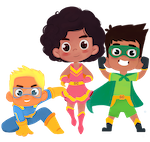What is Dyspraxia?
Dyspraxia is a developmental disorder that causes difficulty in activities that require co-ordination, such as football (gross motor skills) or writing (fine motor skills) for example. Dyspraxia is becoming more widely known and identified in children at earlier ages, due to better understanding of the condition and better access to specialist assessments. Dyspraxia can be seen in children from a young age and it can present from mild to significant.
Dyspraxia is known as a Developmental Co-ordination Disorder (DCD) but it affects more than just an individual’s physical ability. Dyspraxia not only affects co-ordination, but also impacts an individual’s ability to process information, particularly tasks that require sequences like getting dressed or making a cup of tea. Furthermore, as a child grows and becomes more aware of their difficulties, this can have a negative impact on their self-perception, confidence, motivation and ability to form or retain relationships.
Often, children with dyspraxia can be seen as emotionally immature or as having behavioural problems. These views can be unhelpful as these types of behaviours are usually due to the child’s coping strategies of how to manage what can be stressful situations for them. A child who finds it difficult to follow instructions may use avoidance as a strategy to escape the stress that sequencing may cause them. Parents and Professionals may see this as ‘challenging behaviour’, as the child is viewed as ‘choosing’ not do what they have been asked (maybe 4, 5, 6 or 1000 times which can be very frustrating for both the adult and child). This would usually lead to consequences for the child which will be very distressing for them, as they wouldn’t necessarily understand why they are being punished.
Check out this short video from Visual Knowledge on Youtube
Support
The best support for any child will always be reassurance from their parents and carers. Letting the child make mistakes and telling them that “it’s OK”, will give them confidence in trying new things without the fear of failure. If the child has siblings, cousins or close friends, never compare their abilities and offer lots of praise towards your child for trying to take part or just having a go.
There are some practical support aids for children such as specialised cutlery, non-slip mats, pencil grips and sloping boards for writing. Hand rails can be placed around the home to help your child stabilise themselves in places they find difficult such as stairs, and even getting in and out of the bath.
If you suspect that your child may have dyspraxia, then we recommend speaking to school staff such as the class Teacher or the Head of School. You can ask to arrange a meeting with the Special Educational Needs Co-ordinator (SENCO) who can help put a support or care plan in place to help your child within school. If your child is prone to injuries, always seek advice from your local GP and question whether a referral for an assessment with an Occupational Therapist would benefit him/her.
There are also many games and activities which can support your child’s development both physically and cognitively. All of the activities suggested below should be fun. Remember that it’s OK if the child loses, fails, miss things, falls over or doesn’t want to play at all. Remember that the most important thing is to allow them to try it out and offer reassurance, it’s ok to feel the way they feel. The more often you play, the more confidence your child will gain.
Simple Activities to Explore at Home
Many activities have a level of risk, such as learning to ride a bike or learning to swim. Always make sure your child has the appropriate safety gear to take part in the activity that is planned, and always make sure they are appropriately supervised at all times.
- Craft Activities such as Drawing, Cutting and Sticking
- Dot to Dot Books
- Playing Cards
- Trampoline
- Simon Say’s
- What’s the Time Mr Wolf?
- Cosmic Kids Yoga on Youtube
More Difficult Activities
- Obstacle Courses
- Learning to swim
- Learning to ride a scooter
- Learning to ride a bike
Fun Games
Many activities have a level of risk, such as learning to ride a bike or learning to swim. Always make sure your child has the appropriate safety gear to take part in the activity that is planned, and always make sure they are appropriately supervised at all times.
Arranging games and activities that you know your child will be able to do will always be a confidence boost to them. If there are more than just one child taking part, then team games will always be better that competitive games. This will also help with making friends and forming better social skills !
As children with dyspraxia can have difficulty with co-ordination, control, balance and precision; there are lots of quick and easy games that all children can get involved with which will support their development.
Super Crew Cards
Whether it’s a simple game of snap or matching pairs, The Super Crew Flash Cards are a fantastic resource to have as a parent, carer or professional. The cards have a fun and unique design that children love and are made larger and thicker than regular playing cards, making them easier to hold and more durable. Go to thesupercrew.co.uk to order yours.
Ball games
Catch
As a parent, carer or professional, you may notice when playing ball games such as ‘catch’, your child may close their eyes and try protect themselves from being hit by the ball by covering their face with their hands or by turning away. The unpredictability of moving objects can be frightening, particularly if they are coming in at speed.
Instead of using a regular ball, try using a balloon which floats slowly. Moving on from this, you can have your child hold a basket or large bowl to increase their success of catching the objects that are tossed.
Playing ‘Keep it Up’ trying not to allow a balloon to touch the floor can also be lots of fun and these activities will support hand/eye co-ordination and balance. Varying the position of your child will also add or reduce difficulty such as sitting, kneeling or standing.
Another variation on this game can be ‘Roll and Catch’. Try sitting on the floor facing your child with legs as wide as they will go (or in a larger circle if there are more than 2 playing). Roll a ball between the players’ legs and you can add more balls or sit further away to make it more challenging. This game can support with precision skills.
Football Skills
There are lots of football type activities that can help your child. These activities can have lots of benefits with balance, co-ordination, strength and overall fitness. As football is a team sport as well as being competitive, it is a great way to build social skills and offer a sense of belonging.
One Touch
Using a regular ball, you and the child stand short distance from each other and gently kick the ball back and forth. Gradually widen the distance between you to add difficulty to the game.
Playing ‘One Touch Wallie’ Children can play by themselves, or by taking turns kicking a ball against a wall with a friend, each player can only kick the ball once and a player loses when they miss the wall and the game can restart.
Dribbling around objects using cones or any other objects in the garden can be good for developing control skills. Start slowly and have your child walk whilst gently kicking a ball navigating around the objects that are laid out. Getting your child to focus on the ball and where they are going can be really tricky but after several attempts you can use a stop watch to time the child around the course.
Swing Ball
A classic garden game! Swing Ball is an excellent game for hand eye co-ordination. You can start by counting how many times your child can hit the ball in a row before missing, or how many hits it takes to get the rope from the top to the bottom. This will help get the child used to the game and more confident when it comes to playing against someone else.
Another great activity for developing co-ordination is simply bouncing a tennis ball on a racket. Counting who can get the highest score. Using Ping Pong balls and paddles makes the target smaller and adds difficulty to this game
Rope Games
Using a skipping rope for different games can be useful for co-operative and team skills. Apart from just skipping there are lots of other games to play.
One person can hold the end of the rope at a low level and spin around. The other players must stand in a circle and jump when the rope comes to them. Making the rope higher adds difficulty to this game.
Use the skipping rope to play ‘Limbo’. Either have a person at both ends of the rope, holding it at shoulder height to begin with and the player has to pass under by bending backwards. Lower the rope after each go to add difficulty. If you don’t have enough people to hold the rope, you can always tie one end to something such as the garden fence.
Another variation of this would be the ‘High Jump’. Start low and have your child jump over the skipping rope. Move the rope a little higher after each go to add difficulty.
All of the suggested activities should be fun and non-threatening for you child. It’s OK if they lose, fail, miss things, fall over or don’t want to play at all. Remember that the most important thing is to allow them to try it out and offer reassurance that it’s ok feel the way they feel. The more often you play, the more confidence your child will gain.
Computer Games
Whilst we want to encourage children with dyspraxia to be as active as they can to support their physical development, it’s also important for them to rest. Playing computer games is a super fun way for them to both rest and play. Gaming not only stimulates the brain in areas such as problem solving, but also supports fine motor skills and hand to eye responses and coordination. Gaming can also be a good way to increase social skills when playing online with friends which is an added benefit. Always ensure that you limit the time on screens and that your child is playing age appropriate games. It is extremely important to follow strict online safety guidance if connecting with others online such as, never sharing personal information including real name, address or school they attend.
Book reference:
Can’t Play Won’t Play by Sharon Drew and Elizabeth Atter. 2008; Jessica Kingsley Publishers. London. Purchase from Amazon

